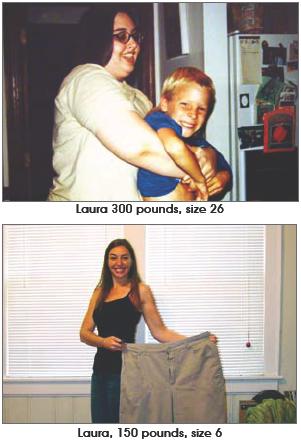Why Therapy?
|
Maybe, over the course of your weight loss, you have encountered new or intensified feelings. Perhaps during a pre-op evaluation, a psychologist encouraged you to think about therapy. Maybe you think therapy is not for you. Whatever your case may be, there are plenty of excellent reasons why working with a therapist may help you achieve success for a lifetime. Therapy is a process that allows us the unique opportunity to explore ourselves from the inside out. We are able to re-examine our behaviors, patterns, relationships, and feelings. In an attempt to overcome self-esteem issues and our obsession with weight and dieting, we are forced to examine the vicious cycle that has occupied our mental energy for far too long. The vicious cycle consists of eating large amounts of food in a short time period. We begin to eat when we are angry, sad, happy, lonely... and it soon becomes our coping mechanism for managing emotions and feelings. The cycle is often set off by a trigger. It then moves into the consequence stage: the time we spend punishing ourselves for overeating. We feel full, and the negative messages begin: “I will starve myself for the entire day to make up for the binge,? or “I am weak and pathetic and no one will ever love me.? The negative messages touch upon core beliefs or thoughts we developed early on about ourselves. As a result, we wind up with uncomfortable and painful feelings that were created by the thoughts. In an attempt to alleviate the feelings, we turn to food to make us feel better, and the cycle begins again. Therapy teaches us how to reframe our thoughts and feelings in order to stop the vicious cycle. In the process, mutual trust and hopefulness develop between the therapist and patient. It provides a safe environment to explore emotions and gain an understanding as to why we use food to numb ourselves. Through therapy we begin to realize that issues around weight and body image begin early in life. We internalize core beliefs or messages we hear in childhood which get played out into our adult lives. Larissa, a 24-year-old woman, came to therapy when she had hit rock bottom with her compulsive overeating and depression. She reported that after work she would come home and binge until bedtime. Binge eating is defined as “consumption of large amounts of food in a short period of time.? Larissa had difficulty understanding why she binged, because she enjoyed her job as an elementary school teacher. During our sessions I learned that Larissa, since the age of eight, had been weighed by her parents every day after school. She was rewarded if the numbers went down, and punished if they went up. Her punishment often came in the form of physical and emotional abuse. Her mother was a compulsive over-exerciser and her father weighed and measured his small portions of food. Larissa grew up internalizing negative messages about her body. She began to believe that she was worthless and disgusting, and in an attempt to feel better she turned to food: the only thing which seemed to make her feel better. Larissa would secretly eat junk food in her closet and began hiding food around her room. When Larissa started therapy, she did not recognize the connection between her bingeing and the childhood abuse she endured. Therapy offered her a place where she could talk about her past and present, begin to connect her behaviors with food to her feelings, and implement alternative coping mechanisms. Debra is a 49-year-old woman who grew up in Germany and came to the United States once at 18 through an exchange program, and then again to stay at 27. She remembers bingeing from an early age. By the time Debra was five years old, she was referred to as “the difficult child.? She was the first girl, and her family did not embrace or accept emotions, as evidenced by the fact that Debra was told that “there are no hugs in this household.? She learned early on to keep all her feelings inside where they went untouched and unexamined for years and years. At the age of 12, Debra was sexually abused, a fact that she had never revealed prior to therapy. She did not have many friends and had never sought treatment for her bingeing. As her 50th birthday approached, she became more certain that she did not want to spend the remainder of her lifetime hidden away —alone with food and nothing else. Debra began to understand how repressed her feelings were and how different she always felt from her prescribed upbringing. Debra is an accomplished woman with a fulfilling career in international business, but she struggles to feel fulfilled in other areas of her life. She has not been in a relationship in over 20 years and longs for intimacy. She came to therapy because after endless years of dieting, yoga, meditation and travel, her weight did not change and she still secretly binged on food. Within three months of beginning therapy and joining a support group, Debra opened up to others about her pain and anger towards her family. She began to realize that there was nothing “difficult? about her, but that her parents knew no other way to raise a young girl. Debra continues to work on forgiveness and acceptance in order to heal her childhood pain. There is a great deal of shame and embarrassment surrounding obesity and body image. Society lets us know that they disapprove of us, and we internalize that as self-hate. Therapy is essential; before you can really conquer your weight issues, you have to conquer your lack of acceptance and compassion for who you are. Otherwise, you will continue to use food as a means to self-soothe. While therapy is a process and healing emotional wounds is not an easy task, ObesityHelp.com is a tool that offers a new way to cope. Use that tool. If you do not get to the root of your feelings, it does not matter what diet plan or surgery you endure, because inevitably the weight will come back. We do not binge because we love food. We binge because we know of no other way to manage our feelings. Whatever your feelings, experiences and challenges, you are not alone—and it is never too late to take control of your life. Therapy? Thumbs Up! I literally lost half of myself. At an energetic 150 pounds and svelte size 6, I have a lot to celebrate! However, I’m also dissatisfied with my job, worried about a good friend with cancer, trying to disengage from an unhealthy relationship, newly on anti-depressants, unable to sleep, and completely exhausted both physically and emotionally. “Calories in, calories out? seems so simple, but it doesn’t take into account the emotional roadblocks most of us set for ourselves along the way. My extreme weight was a protective physical boundary, so losing it wasn’t simply an issue of willpower (a word thin folks toss around easily); in order to maintain this weight loss I have to develop emotional boundaries to replace the weight. I’ve always been a fan of therapy, but feel it’s even more essential during this kind of life change. I’ve devoted energy and focus to my body, so why treat my emotional self any differently? The change isn’t just physical, and losing weight doesn’t fix everything. My therapist helps me untangle the conflicting ideas I have of myself and my worth—a task every bit as important as proper nutrition and exercise. With that oh-so-familiar negative monologue still playing in my head, I don’t want to tackle this one alone.
January 2008
|

 email to a friend
email to a friend printer-friendly version
printer-friendly version
 Jessica Slotnick, LCSW-R, ACSW, is a psychotherapist in New York City. She may be reached by phone at 917-379-2429.
Jessica Slotnick, LCSW-R, ACSW, is a psychotherapist in New York City. She may be reached by phone at 917-379-2429.
